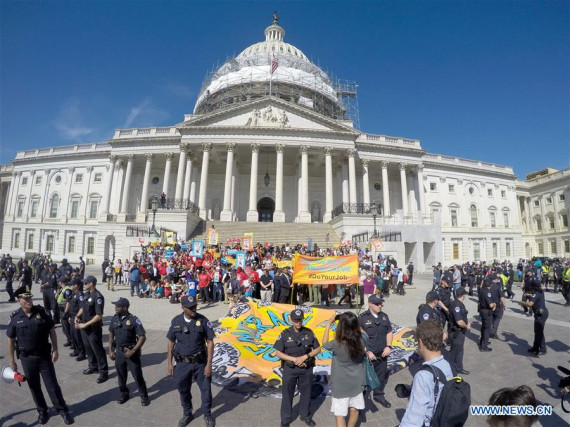
U.S. Capitol Police surround protestors who volunteer to be arrested during a demonstration against Money Politics on Capitol Hill in Washington D.C., the United States, on April 18, 2016. (Xinhua file photo/Yin Bogu)
Uncertainty from the U.S. presidential election could prompt the Federal Reserve to delay hiking interest rates until after the election, U.S. experts have said.
Following a strengthening U.S. job market and the benign market reaction to Britain's referendum vote to leave the European Union in June, Fed officials were debating over whether to raise interest rates soon.
Some officials preferred to "wait for more evidence" that U.S. inflation would rise to the central bank's objective of 2 percent on a sustained basis, while others anticipated that economic conditions would "soon warrant" another rate increase, according to the Fed's July 26-27 meeting minutes released Wednesday.
"I think the Fed is certainly getting ready to move again," Charles Collyns, managing director and chief economist at the Institute of International Finance (IIF), told Xinhua. "I think it's just a matter of timing."
Citing a strong job growth in July and other solid U.S. economic data in recent weeks, Collyns said it's "possible" for the Fed to raise interest rates as soon as September.
The Fed views that the U.S. economy is growing "at a decent pace" with signs of "picking up in wage pressures" and the normalization of labor market conditions, he argued.
But the central bank will also "be patient" on rate hikes due to a number of global risks, including spillover effects from Brexit vote, he said, adding that the Fed wants to be reassured by the strength of the U.S. economy and wants to avoid contributing to volatility.
While Fed officials generally agreed that near-term risks to U.S. economic outlook had diminished in recent months, some officials were still concerned that longer-term global risks related to Brexit vote remained.
"Some noted that the U.K. vote, along with other developments abroad, still imparted significant uncertainty to the medium- to longer-term outlook for foreign economies, with possible consequences for the U.S. outlook," the minutes said, noting that the Fed would continue to closely monitor global economic and financial developments.
Robert Kahn, a senior fellow for international economics at the Council on Foreign Relations in Washington, D.C., said the Fed would raise interest rates more slowly due to sluggish global growth, probably one more rate hike this year at most.
Despite the Fed's avowed political independence, uncertainty from the U.S. presidential election in November could also cause the central bank to delay further rate hikes.
A majority of 62 economists surveyed by the Wall Street Journal this month said that uncertainty from the presidential election has hurt the U.S. economy to some extent, as U.S. business investment has declined for three consecutive quarters.
Consumers and businesses are reluctant to spend and invest if there's big uncertainty about the next U.S. administration's tax, regulation and other policies, economists said.
Republican presidential nominee Donald Trump's policy proposals are likely to be more disruptive to the U.S. economy and financial markets as he threatened to pull the U.S. out of the World Trade Organization (WTO), impose high tariffs against imports from other countries and renegotiate U.S. debt.
His Democratic rival Hillary Clinton is seen as more likely to continue the Obama administration' s current policies.
Moody's Analytics estimated in a recent report that the U.S. economy could suffer a lengthy recession with nearly 3.5 million job losses and a 7 percent unemployment rate at the end of Trump's four-year presidency if all his economic proposals are adopted.
"The Fed is non-political, it's certainly not going to be influenced in decisions by desire to help one candidate or the other," said Collyns, a former assistant secretary for international finance at the U.S. Treasury.
"But if it sees the presidential election as leading to intense uncertainty in the market, that could be a factor that will lead to delay rate increases until after the election in December," he said.
"There're a number of other uncertainties. The Fed will be looking to make sure the election is not adding too much uncertainty into the market," he said, predicting that the central bank is more likely to raise rates in December than September.
The Fed has two policy meetings before the presidential election on Nov. 8. The next policy meeting after the election is scheduled for Dec. 13-14.
About 71 percent of 62 economists surveyed by the Wall Street Journal this month believed that the Fed will wait until December to raise rates.
The Fed raised its target range for the federal funds rate by 25 basis points to 0.25-0.5 percent in December last year, the first rate hike in nearly a decade.
But a slowdown in global economy since the start of this year and other global financial risks has made Fed policymakers cautious to hold off on any further rate hikes.


















































